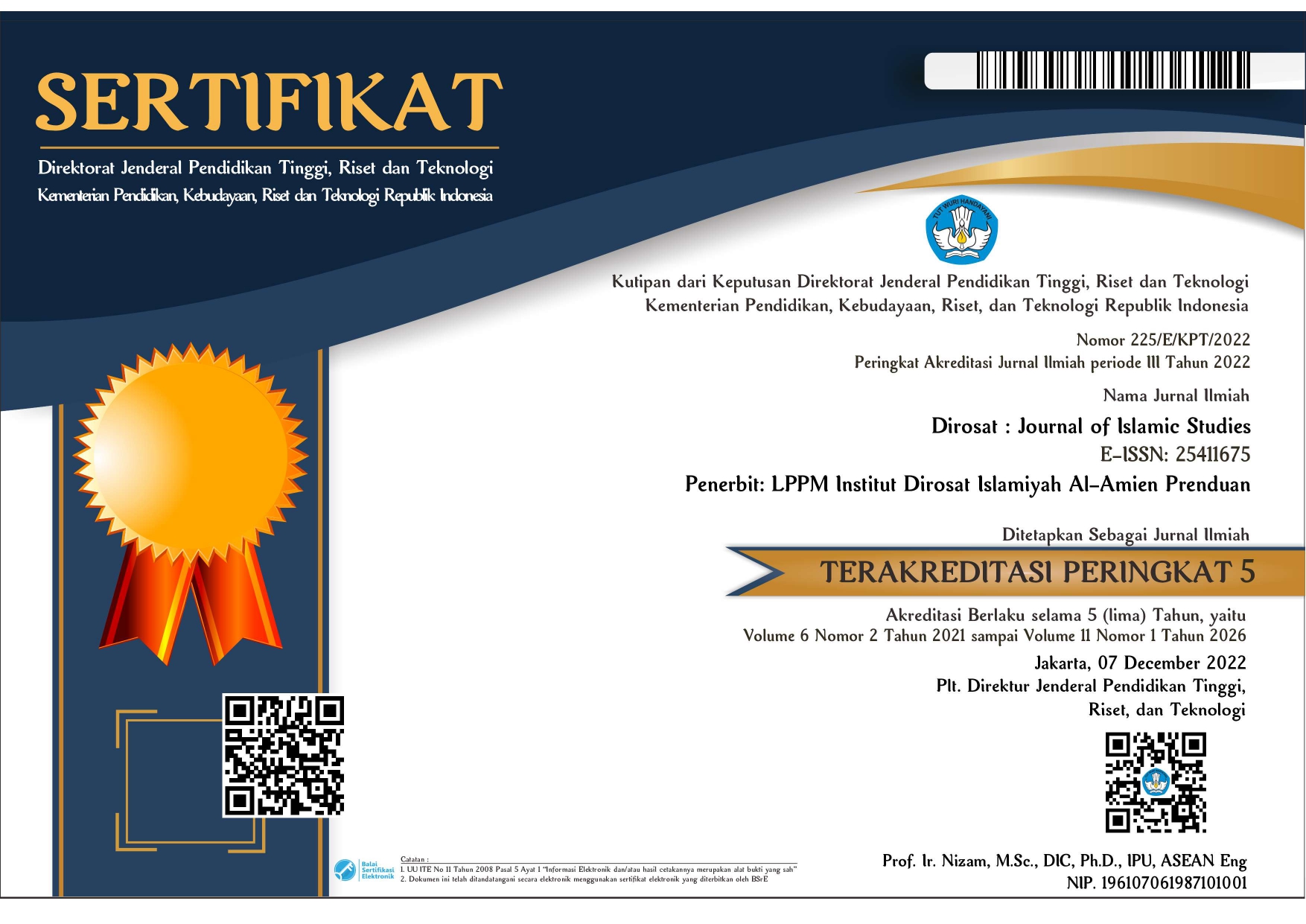البانتشاسيلا بين القبول والرد
Abstract
Abstrak: Indonesia is a republic nation that Muslims as majority of nitizen have played considerable role even since the struggle for Indonesian independence. Nonetheless, the country indeed does not necessarily adhere to Islamic system, rather instead to the so-called ‘Pancasila’ (Five Principles), e.g. belief in the One and Only God, just and civilized humanity, unity of Indonesia and democratic rule that is guided by the strength of wisdom resulting from deliberation so as to realize social justice for all the people of Indonesia. In the fact, Pancasila itself actually has raised a hotly-debated discussion in both politics and religion till Indonesian today, particularly in the matter of Islamic values enactment. Because of that, the present study aims to find the argumentations from both of sides and the intersection of the dispute by employing the inductive and analytic method with involves gathering and analyzing material relevant to the research. The study eventually concluded that most Pancasila’s values both its theory and interpretation, according to the People’s Consultative Assembly, are not in accordance with that of Islamic values. The democracy that lies under Pancasila in fact does not benefit to the people, instead it merely acts as a slogan, formality, meaninglessness, and purely theoritcal.
Â
Keywords: Pancasila, Islamic values, hotly-debated discussion.
Â
إن إندونيسيا دولة كان المسلمون Ùيها يلعبون دورا مهمّا ÙÙŠ استقلالية جمهورية إندونيسيا من قبضة الاستعمار الأجنبي، كما أنهم يشكلّون الغالبية العظمى من الشعب الإندونيسي. وعلى الرغم من ذلك إلا أنها لا تØكم بالشريعة الإسلامية بشكل كامل شامل، بل كانت الدولة تقوم على أساس البانتشاسيلا (المبادئ الخمسة)ØŒ وهي: الربانية المتÙردة، والإنسانية العادلة المهذبة والمتØضرة، والوØدة الإندونيسية، والشعبية الموجهة بالØكمة والØصاÙØ© ÙÙŠ الشورى النيابية، والعدالة الاجتماعية لكل المواطنين الإندونيسيين، Ùهي أساس ÙلسÙÙŠ ومصدر أساسي للقانون الوطني والنظام القانوني لجمهورية إندونيسيا. لذلك،. Ùليست جمهورية إندونيسيا بالبلد الثيوقراطي ولا العلماني ولا الشيوعي بل هي دولة البانتشاسيلا.
Keywords
References
Adian Husaini. (2012). Pancasila Bukan Untuk Menindas Hak Konstitusional Umat Islam. Jakarta: Gema Insani press.
Al-Habib Rizieq Syihab. (2012). Wawasan Kebangsaan Menuju NKRI Bersyariah. Kuala Lumpur: Malaya Universiti
Amani Burhanuddin Lubis. (2010). Demokrasi di Indonesia. Journal of Indonesian Islam, Institute for The Study of Religion and Society (ISAS) and The Post Graduate Program (PP) The State Institute for Islamic Studies (IAIN) Syarif Hidayatullah Jakarta.
As’ad Said Ali. (2009). Negara Pancasila Jalan Kemaslahatan Berbangsa. Jakarta: Pustaka LP3ES.
Einar Martahan Sitompol. (2010). NU & Pancasila. Yogyakarta: LKiS Yokyakarta.
Hamka Haq. (2001). Pancasila 1 Juni & Syariat Islam. Jakarta: RM Books.
Ahmad Hariadi. (2015). 45 Butir Nilai Luhur Pancasila Bagian Ajaran al-Quran. Jakarta: Yayasan Kebangkitan Kaum Muslimin.
Majelis Permusyawaratan Rakyat 2009-2014. (2012). Empat Pilar Kehidupan Berbangsa dan Bernegara. Jakarta: Sekretariat Jenderal MPR RI.
Ngudi Astuti. (2012). Pancasila dan Piagam Madinah. Jakarta: Media Bangsa.
Pandji Setijo. (2011). Pendidikan Pancasila Perspektif Sejarah Perjuangan Bangsa. Jakarta: PT Grasindo.
Viktor Bungtilu laiskodat. (2017). Pancasila & Toleransi Bangsa. (Retrieved 14th February 2018). http://www.mediaindonesia.com/news/read/108946/pancasila-dan-toleransi-kebangsaan/2017-06-14.
Mpu Prapanca. )1995). Desawarnana (Nagarakrtagama). Leiden: KITLV Press.
M. Abdul Karim, Menggali Muatan Pancasila dalam Perspektif Islam.
Soepardi, Endang Sri Sulasih, Tridays Repilita. (2016). Tujuh Pilar Bangsa: Pancasila dan Undang Undang Dasar 1945. Tangerang: Pustaka Mandiri.
Munawar fuad Noeh & Mastuki HS. (2001). Menghidupkan Ruh pemikiran KH.Ahmad Siddiq. Jakarta: Gramedia Pustaka Utama.
DOI: 10.28944/dirosat.v6i1.458
Refbacks
- There are currently no refbacks.

This work is licensed under a Creative Commons Attribution-NonCommercial-ShareAlike 4.0 International License.








